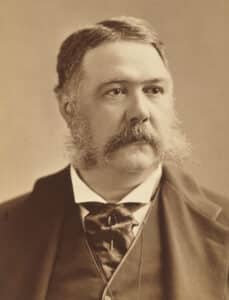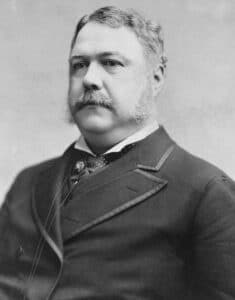Josh Reviews: The Unexpected President by Scott Greenberger

Chester Arthur is a forgotten president if there ever was one. Notable for his magnificent facial hair, it is unlikely that most modern Americans would remember his name, and even less anything that he actually did. For his time, he was at first a simple machine politician in an era when the spoils system was king. He rose in the republican party and eventually became head of the New York Customs House (until Hayes threw him out), one of the most important sources of spoils positions and political money in the country.
Scott Greenberger is a journalist, who has written for numerous prestigious publications. He also has a bachelor’s degree in history from Yale. Arthur is an interesting subject to choose for a biography, as he is among the most “middling” presidents I can imagine. He was never expected to be president, and was unceremoniously thrust into a position he likely did not want. He made the best of it, but he wasn’t a famous man, his personality was generally quiet, and he served most of only a single term. He’s the epitome of ‘easy to forget’.
Despite finding himself in the highest office in the land (and of course, as I often say, not entirely on accident) he was as all vice presidents put into that position without anyone expecting him to become president. The greatest political issue of the day, with reconstruction in the rearview mirror, was the spoils system and reform. Arthur was not the man that anyone would have expected to attempt reform – he had been a piece of the New York political machine, a loyal member and a leader of the most plum position in the whole state. He used that position to reward who he was told to reward, and to shake employees down for political donations when asked. How good they were for the job wasn’t a concern.

Garfield’s murderer was suffering from some kind of mental illness, but the assassination was tied up in how he felt he deserved a job for work he did during the campaign. It was a clear indictment of the system, which prioritized government money in return for services instead of competence. The reform movement was gaining strength before, but the assassination helped turn more people to the cause. Even Arthur, once in a position to do something about it, chose reform instead of entrenchment.
As a personal story, Arthur’s life is a great one. From a machine politician to a defender of reform, from his love of money and wealth to the deep regret over the loss of his wife… Still, Arthur is a poorly known figure because his presidency was not especially brilliant. Compared to the apocalypse his critics feared, though, he was able, if not stellar. He held up under a pressure that he never thought he would face, and within himself he rose to the challenge.
Greenberger chooses a narrative style over a pedantic one, and he writes very well. Sometimes I forgot that I was reading a biography and not a novel. My only complaint is that so much of the book ends up being broken up by mini-biographies of every character in Arthur’s life. It gets a little tiresome, especially given how much I already knew about all of those characters.
I did really love how he wrote the Julia Sand story. Overall, it is an excellent biography of a president who burned all of his correspondence and made it difficult for us to get a look at the interior of the man, and one who had a legitimately lackluster presidency (overshadowed by the death of Garfield) anyhow.

